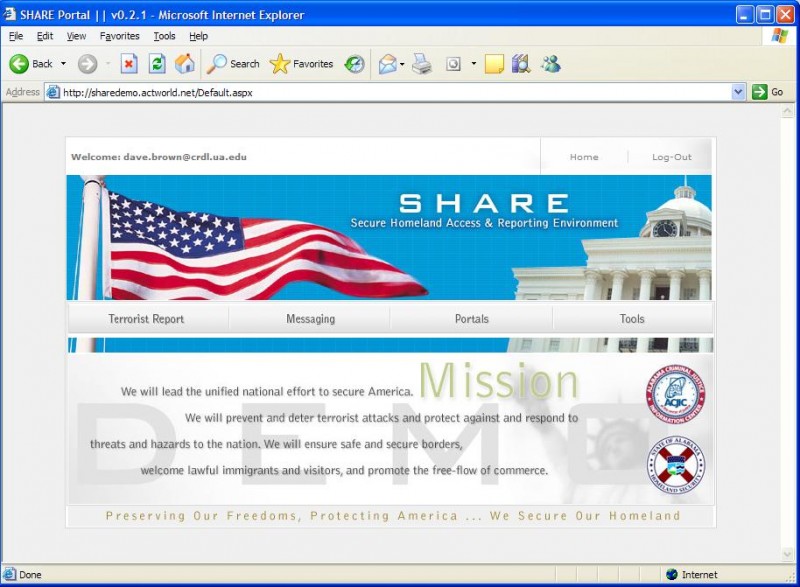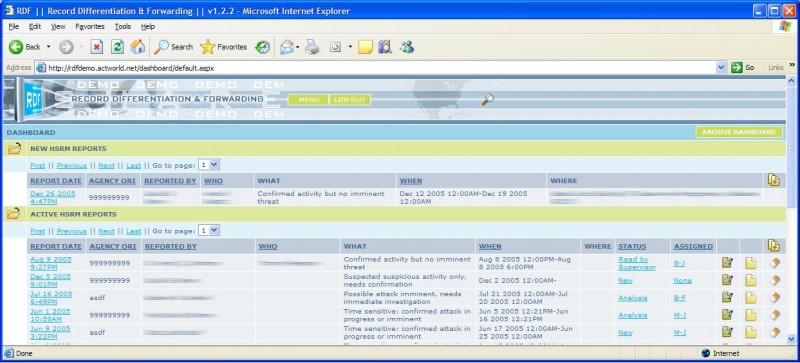SHARE
About
The Secure Homeland Access and Reporting Environment (SHARE) is a web portal developed to establish the critical missing link between State/Federal homeland security officials and field officers (Field officers are defined within this context to be all federal, state, local agency and private sector security officers who may be in situations where they might observe terrorist activity). The state’s Fusion Center is a group of analysts that have been established within the Alabama Department of Public Safety who are responsible for awareness and prevention of not only terrorist activities, but also all major related criminal activities. Once major crimes or terrorist activities are in process, the Fusion Center takes on the responsibilities of assisting in response, protection and recovery.
SHARE was developed with support of the US Department of Homeland Security (USDHS) for the Information Technology Evaluation Program (ITEP). It was one of only 12 nationally funded proposals and served as a prototype for all subsequent Suspicious Activity Reporting (SAR) systems.
While SHARE is strictly for interactions between law enforcement and the state’s Fusion Center, a companion portal, Portal to Uphold a Secure Homeland (PUSH), was also developed under this project to support private sector security personnel who oversee critical infrastructure.
A SHARE Senario
- A law enforcement officer (perhaps acting on a tip from a citizen) encounters suspicious activity on the part of potential perpetrators. At this point no proof of criminal or terrorist activity is needed to set the process in motion.
- The law enforcement officer opens the AlaCOP portal to access the SARS button within the Homeland Security section of the portal.
- By clicking the SAR button, officer accesses a reporting mechanism that will call for a simple report to be completed and submitted.
- The submitted SAR is sent directly to the Fusion Center where it will be entered into the SHARE system.
- The SHARE system treats the SAR as a new case, giving a supervisor ability to:
- Assign the SAR case to a Fusion Center analyst
- Adjust the status code of the SAR
- Close out/Archive the SAR case if there is insufficient grounds for continuing the investigation
- All SARs are maintained for potential future reference
- The Fusion Center analyst assigned to the case may:
- Add information to the case
- Make corrections to the SAR
- Add displays (pictures, figures, files, etc.) to the case
- Enlarge the investigation by involving other Fusion Center members and/or law enforcement officers via the SHARE Message Center
SHARE Message Center
- Messages reside on a single secure server and data structures are used to determine which members of AlaCOP can view which messages. The message center is not e-mail and does not depend on e-mail.
- Fusion center personnel have direct access to the message center through SHARE.
- The message center facilitates the development of two types of groups (which can be created by any member):
- Open Group: is announced to all members and allows anyone to join. The purpose is for open investigations in which all involved members can contribute information to the group.
- Closed Group: for confidential investigations where the group leader wants full control of group members.
- Messages sent to a group go to all members of that group.
- Group members can easily “Reply To” a group once they receive a message from the group.
Screenshots
Below, note the four major tabs of the home page:

- Terrorist Report: when a Suspicious Activity Report (SAR) is submitted via AlaCOP it will appear under this button, which provides access to the SAR case management system for the Fusion Center.
- Messaging: this provides access to the message center, as described above.
- Portals: this provides access to the large number of portals that have been set up by the federal government and other states that are to some extent comparable and parallel in mission to SHARE.
- Tools: this is a set of search and other tools that have been set up for the Fusion Center personnel.
When a SAR comes in from the field SHARE will detect it and automatically generate a message to those Fusion Center members who are on call. Thus, no time elapses from the submission of the SAR until it is acted upon. The SAR itself goes into a case management system, the main screen of which is given below.

Notice that the new SAR is in a separate area at the top of the list. It will remain there until it is activated by a supervisor, which will include the assignment of the SAR to a Fusion Center investigator. A log is kept of all SAR case updates, and thus analysts can modify and update the SAR without fear of losing any information. All Fusion Center personnel have access to all SARS. The “Status” and Assigned” fields can only be modified by a Fusion Center supervisor.